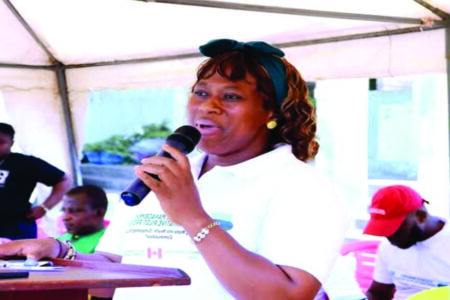By Precious D. Freeman
The Environmental Protection Agency of Liberia (EPA), in collaboration with the Monrovia City Corporation (MCC) and other key stakeholders, has launched a composting site at Jorkpen Town Market, under the Solid Waste Management Transformative Pilot Project.
This initiative aims to tackle the city’s waste crisis by turning organic waste into valuable compost, reducing landfill waste, and promoting sustainable waste management practices.
The launch event was attended by the Deputy Executive Director of the EPA; Dweh Siehwloh Boley, City Manager of Monrovia; Jones N. Williams, president of the Liberia Marketing Association (LMA); Elizabeth Sambola, community-based enterprises (CBEs); local leaders; and other partners.
Speaking at the launch, the lead coordinator, Vermont Sangah Lloyd, emphasized that the project is not just about waste disposal but about reimagining waste as a resource.
“This pilot is not just a program; it is a movement. A movement to restore dignity to our communities and reignite local ownership in managing our environment,” she stated.
Implemented under the MRV Climate Action umbrella, the project is a joint effort between the EPA, MCC, LMA, and CBEs.
It is supported by the Government of Canada through Novasphere, with technical guidance from waste management specialist Christopher Godlove from Brussels.
Monrovia generates about 800 tons of solid waste daily, yet only 45% is properly collected. The remaining waste accumulates in streets, waterways, and dumpsites, posing severe environmental and health risks.
A baseline study conducted across four key markets—Old Road, Fiamah, Rally Town, and West Point—revealed that each generates an average of 89.3 kg of organic waste daily, primarily leafy greens (83.3%), fruits (10.8%), and vegetables (5.1%).
These findings underscore the potential of composting in reducing landfill waste, cutting methane emissions, and supporting urban agriculture.
She continued that the goals of the Solid Waste Management Transformative Pilot Project includes; Sourcing Organic Waste – Identifying feedstock from markets and surrounding communities.
Building Community Ownership – Establishing four composting partnerships with CBEs, Empowering Local Champions – Training five national and local leaders to advance sustainable waste management.
Developing a Sustainable Business Model – Ensuring long-term operational efficiency in compost production.
Project Achievements so far includes formation of a Solid Waste Coordination Committee (SWCC) led by EPA and MCC to oversee progress.
Identification of five feedstock locations for organic waste collection, completion of an Organic Waste Baseline Study, providing critical data for implementation.
Training and certification of four CBEs responsible for waste collection and transport, A Knowledge Exchange Visit to Tanzania, allowing stakeholders to learn composting best practices from Nipe Fagio.
Community mapping and collection point identification for seamless waste management, Lloyd emphasized that the launch of the composting site is only the beginning.
“This facility is a demonstration of action—proof that when data meets vision, the community meets commitment, and when waste is seen as worth it, transformation happens.”
The initiative is expected to divert waste from landfills, reduce methane emissions, create green jobs, and enhance urban and peri-urban farming.
Lloyd urged stakeholders, CBEs, and the wider community to embrace and sustain the project, ensuring it grows beyond a pilot phase into a national climate-smart waste management model.
Let’s compost our way to a better future,” she concluded.
The Solid Waste Management Transformative Pilot Project is a collaborative initiative under MRV Climate Action, spearheaded by EPA and MCC, with strong support from LMA, CBEs, and community leaders.
The project is generously funded by the Government of Canada through Novasphere.
EPA, MCC Launch Composting Site
